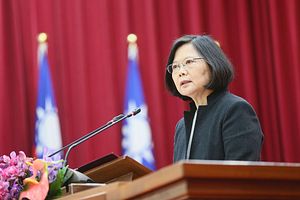On October 18, Chinese President Xi Jinping kicked off the Chinese Communist Party’s (CCP) 19th Party Congress with a three-and-a-half-hour speech. His strong rhetoric against Taiwan in his work report immediately triggered a response. On the same day, Taiwan’s Mainland Affairs Council (MAC) issued a statement urging Beijing to “seek a new model of cross-strait relations with new thinking.”
Xi said in his work report that China can “defeat any intention of ‘Taiwan independence’ in any form.” He stressed that China will never “allow any person, any organization, any political party, at any time, in any form, to separate any piece of Chinese territory from China.” Xi also urged Taipei to recognize the “1992 consensus,” which Taiwan’s President Tsai Ing-wen has been refusing to publicly acknowledge since she came into office last year. Xi’s stronger-than-usual remarks toward Taiwan instantly attracted the attention of both Taiwan’s government and media.
In response, MAC said the CCP’s comments on Taiwan were “regrettable,” as Beijing “intentionally highlighted” its “defensive attitude” toward Taipei.
The MAC emphasized that “The Republic of China is a sovereign country; it is absolutely the right of Taiwan’s 23 million people to decide Taiwan’s future and the development of the cross-strait relations.”
Underlining that Taiwan’s democratic system was its core value, the MAC “solemnly” urged Beijing to “face the fact that it is hard to win the Taiwan people’s heart by one-sidedly pushing for the ‘one country, two systems’ policy and ‘One China principle’.”
In addition, the MAC pointed out that Taiwan’s government under Tsai, which has remained “reasonable, pragmatic and restrained without making provocations” in the past year, does “respect the historical facts of the 1992 talks.”
For those people who are not familiar with cross-strait relations, it’s hard to interpret the game of words here between Beijing and Taipei. While Beijing has repeatedly pushed Tsai’s ruling Democratic Progressive Party (DPP) to “recognize the the historical facts of the ‘1992 consensus’,” the DPP kept referring to the “1992 consensus” as the “1992 talks” although it has said it respects the “historical facts.” Beijing has never overlooked the nuance in wording, nor has the Taiwanese media or the DPP’s rival party, the Kuomintang (KMT).
Also on October 18, former Taiwanese President Ma Ying-jeou of the KMT publicly urged both governments across the strait to promote peaceful development “on the basis of the ‘1992 consensus’ and anti-Taiwan independence” — which is what the Chinese mainland has constantly called for since Tsai came into office.
Through his spokesperson, Xu Qiaoxin, Ma said again that the “1992 consensus,” or the “One China principle,” actually means that while both sides recognize there is only one China, both sides can interpret the meaning of that “one China” according to their own definition. Ma’s remarks have been widely reported by the Chinese mainland’s media.

































